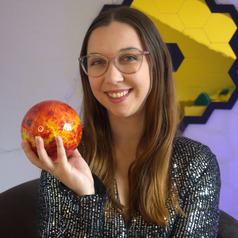Expand to read Kirsten Banks's opinion.
No
We need to be mindful of the language we use in the exploration of space

Kirsten Banks
Lecturer, School of Science, Computing and Engineering Technologies, Swinburne University of Technology
We need to be mindful of the language we use in the exploration of space
Kirsten Banks
Lecturer, School of Science, Computing and Engineering Technologies, Swinburne University of Technology
No.
We need to be mindful of the language we use in the exploration of space, particularly the intentions it conveys as we strive to become a space-faring population.
The term "colonisation" carries a heavy historical weight. It refers to the act of settling among and establishing political control over a place, regardless of those who inhabit it. We need only to look at our own history to see the ongoing impacts of colonisation on Aboriginal and Torres Strait Islander peoples in Australia.
I remain deeply excited about humanity’s journey into space and the possibility of establishing a human presence beyond Earth. However, I do not believe this pursuit should come at the expense of any potential life.
Respecting the agency of extraterrestrial life – should it exist – is not only an ethical imperative, but also essential to preserve and protect our ability to study such life responsibly and with integrity.
View Kirsten's profile
Expand to read Alice Gorman's opinion.
No
A radical change in thinking is needed before humans are ready to inhabit – not colonise – space

Alice Gorman
Associate Professor in Archaeology and Space Studies, Flinders University
A radical change in thinking is needed before humans are ready to inhabit – not colonise – space
Alice Gorman
Associate Professor in Archaeology and Space Studies, Flinders University
No.
Space is currently being treated as a resource for exploitation in a capitalist system, just like Indigenous lands across the world in the old colonialist model. This is unsustainable.
We often think of space as dead. This has blinded us to the fact that hosting life isn’t necessary for planets, moons and orbits to be dynamic environments. For example, planetary scientists are only just beginning to understand the Moon’s water cycles.
The Declaration of the Rights of the Moon (which I co-authored) states the Moon has the right to maintain ecological integrity. All space environments should have that right.
Does that mean humans shouldn’t aspire to space? Far from it.
For Earth, the philosopher Val Plumwood has proposed the model of co-participation, where the environment is an equal partner rather than just a resource. We can apply this to space. It means we have to consider not only how to prevent irreversible damage, but what celestial environments need from us to flourish.
A radical change in thinking is needed before humans are ready to inhabit – not colonise – space.
View Alice's profile
Expand to read Sara Webb's opinion.
Yes
If humanity endures, living beyond Earth will be essential

Sara Webb
Lecturer, Centre for Astrophysics and Supercomputing, Swinburne University of Technology
If humanity endures, living beyond Earth will be essential
Sara Webb
Lecturer, Centre for Astrophysics and Supercomputing, Swinburne University of Technology
Yes. But with nuance.
Space exploration has driven extraordinary progress over the past 65 years, taking us to the Moon, revealing the effects of microgravity, and fuelling technologies that shape daily life.
As an astronomer, I think in cosmic timescales: in 4 to 5 billion years, the Sun will die, and Earth with it. If humanity endures, living beyond Earth will be essential. But that future isn’t immediate.
Right now, space should primarily serve scientific discovery and fundamental research. Human presence in orbit, like on space stations, provides critical data on how biology adapts to space, laying the groundwork for future missions.
I believe we’ll see the first human on Mars in my lifetime: a scientist, not a settler. Earth remains our best home for centuries if not millennia to come, and our focus should be on understanding and protecting it, while using space exploration to prepare for the very long term.
View Sara's profile
Expand to read Ben Bramble's opinion.
No
Our best hope for survival and flourishing is to focus our ingenuity on restoring this planet, not abandoning it

Ben Bramble
Lecturer in Philosophy, Fenner School of Environment and Society, Australian National University
Our best hope for survival and flourishing is to focus our ingenuity on restoring this planet, not abandoning it
Ben Bramble
Lecturer in Philosophy, Fenner School of Environment and Society, Australian National University
No.
Colonising Mars to “back up” humanity against existential threats is far more likely to endanger us than to save us.
It would concentrate immense, unaccountable power in the hands of a few private individuals and corporations. The same technologies needed to move massive objects and reshape environments in space could be turned against Earth – deliberately or accidentally.
It would inflame rivalries between major governments, heightening the risk of conflict here rather than reducing it.
Any off-world settlement could also become adversarial toward Earth rather than its ally.
And there may be no need. A truly self-sustaining Martian colony is centuries away, technologically speaking. For us to survive this long, we will have to solve the existential threats facing Earth.
Once we have the technology to make Mars liveable, we could simply use it to make Earth liveable again.
Our best hope for survival and flourishing as a species is to focus our ingenuity on restoring this planet, not abandoning it. That’s entirely compatible with continuing to do exciting science in space – using probes, satellites, and telescopes to learn more about the universe without trying to colonise it.
View Ben's profile
Expand to read Art Cotterell's opinion.
No
To speak of "colonising" space invokes a colonial narrative and mindset of extraction

Art Cotterell
Research Associate, School of Regulation and Global Governance, Australian National University
To speak of "colonising" space invokes a colonial narrative and mindset of extraction
Art Cotterell
Research Associate, School of Regulation and Global Governance, Australian National University
No.
To speak of “colonising” space invokes a colonial narrative and mindset of extraction, exploitation and empire-building. These same logics continue to dispossess First Peoples and entrench inequalities between the Global North and South.
The Outer Space Treaty of 1967 reminds us the “use” of space shall be “for the benefit and in the interests of all countries, irrespective of their degree of economic or scientific development”. That vision is hard to reconcile with the world’s richest person, Elon Musk, wanting to establish “a self-sustaining city on Mars”.
What ethics are we co-signing when the person driving these efforts profits from hate speech and evades regulatory accountability?
Nor does a “space race” between the US and China to establish bases on the Moon – framed as rivalry and competition, not shared responsibility and cooperation – square with this vision.
We are experiencing accelerating climate change, geopolitical fragmentation and rising poverty. Colonising space risks extending these crises and their causes off-Earth.
Instead, we could explore how space might help us collectively confront them on our "pale blue dot".
View Art's profile